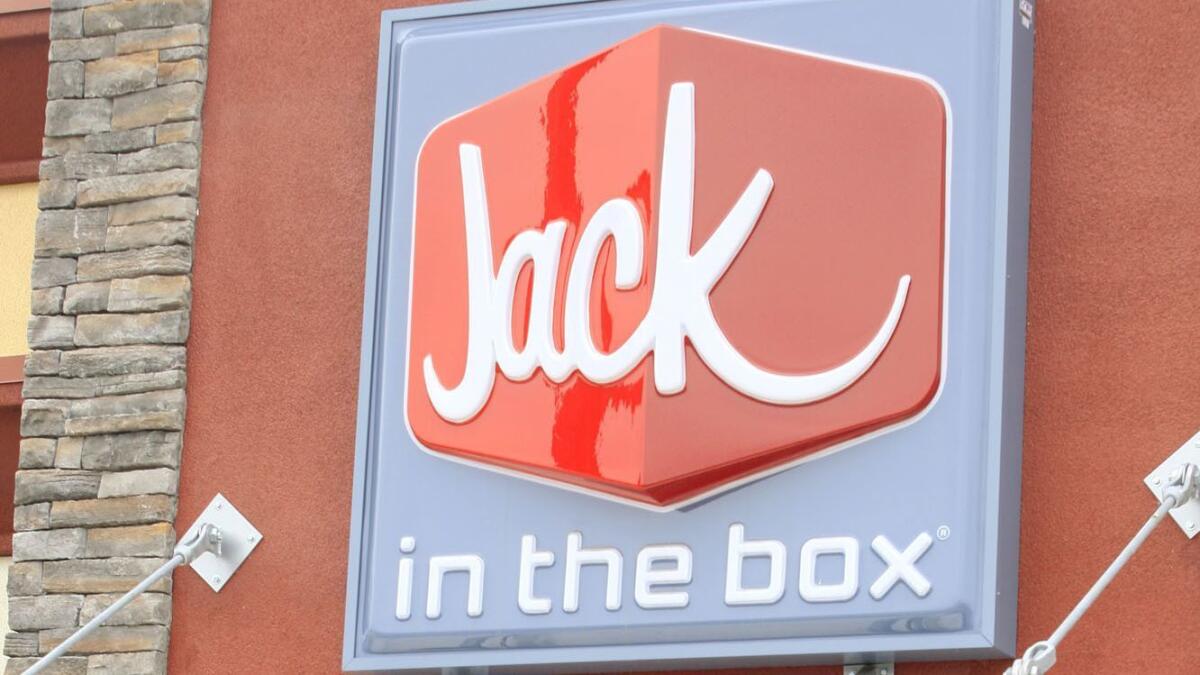Jack in the Box is thinking about selling itself

Jack in the Box Inc. said it is exploring strategic options that include the possible sale of the company, confirming reports that surfaced last month about a potential deal.
The San Diego-based fast food chain said Monday that it has talked with potential buyers and is working with legal and financial advisors. There are no guarantees a transaction will occur, it said.
Jack in the Box is also looking at other strategic options to boost shareholder value, including a previously announced plan to increase debt as part of a recapitalization of the firm.
The company declined to comment further.
Last month, Reuters reported that the company — which opened its first restaurant in 1951 in San Diego — has held discussions with possible buyers as it examined its future in the hotly competitive quick-service restaurant market.
The move was not surprising, according to analysts, given that two activist investors — Jana Partners and Blue Harbour Group — have taken significant ownership stakes in Jack in the Box recently.
There also is an appetite for mergers in the fast food restaurant space. Sonic Corp., for example, is being acquired by Buffalo Wild Wings/Arby’s parent Inspire Brands for $2.3 billion.
Sonic, which has 3,600 drive-in locations, is roughly comparable to Jack in the Box, which has 2,237 restaurants in 21 states.
Other restaurant chains gobbled up by larger rivals or private equity firms in the last few years include Panera Bread, Popeyes Louisiana Kitchen and Ruby Tuesday.
“The money is generally available — even though interest rates are up a bit,” John Gordon, head of industry research firm Pacific Management Consulting Group, said in a recent interview. “There is a growing precedent set by the fact that Sonic went private.”
Jack in the Box’s market capitalization is $2.11 billion based on its stock’s Monday closing price. The company is the fifth-largest quick-service burger restaurant chain in the United States, according to Baird Equity Research.
The company serves up an eclectic menu of fast food — including burgers, tacos and breakfast — that can be customized and ordered at any time of day. It also delivers irreverent advertising featuring Jack the Clown.
Jack in the Box has been tweaking its business model since it sold its Qdoba Mexican restaurant brand to private equity firm Apollo Global Management in March for $305 million.
More than half of Qdoba’s 700 locations were company owned. After selling the brand, Jack in the Box worked to convert most of its remaining company-owned Jack in the Box restaurants into franchise locations. Now, 94% of its outlets are operated by franchisees.
The business model changes have rubbed some franchisees the wrong way. The National Jack in the Box Franchise Assn. has complained about cost cutting, particularly in marketing. It has called for the ouster of Chief Executive Leonard Comma and is seeking at least one seat on the company’s board of directors.
The group has also filed a lawsuit against the company over the allocation of remodeling costs. Jack in the Box said the lawsuit is without merit.
According to the company, rising labor costs have put pressure on franchise operators. The company has balked at cutting prices too much in the wake of rising costs. Jack in the Box’s same-store sales growth — a key metric in the restaurant business — trailed the overall average in the fast-food sandwich industry last quarter, according to research firm NPD Group.
In the company’s most recent earnings conference call, Jack in the Box executives said they plan to offer more “value”-priced bundles to the menu to attract customers while balancing the need to maintain profit margins.
More to Read
Inside the business of entertainment
The Wide Shot brings you news, analysis and insights on everything from streaming wars to production — and what it all means for the future.
You may occasionally receive promotional content from the Los Angeles Times.











